
APIDRA 100 units/mL, SoloStar prefilled pen solution for injection
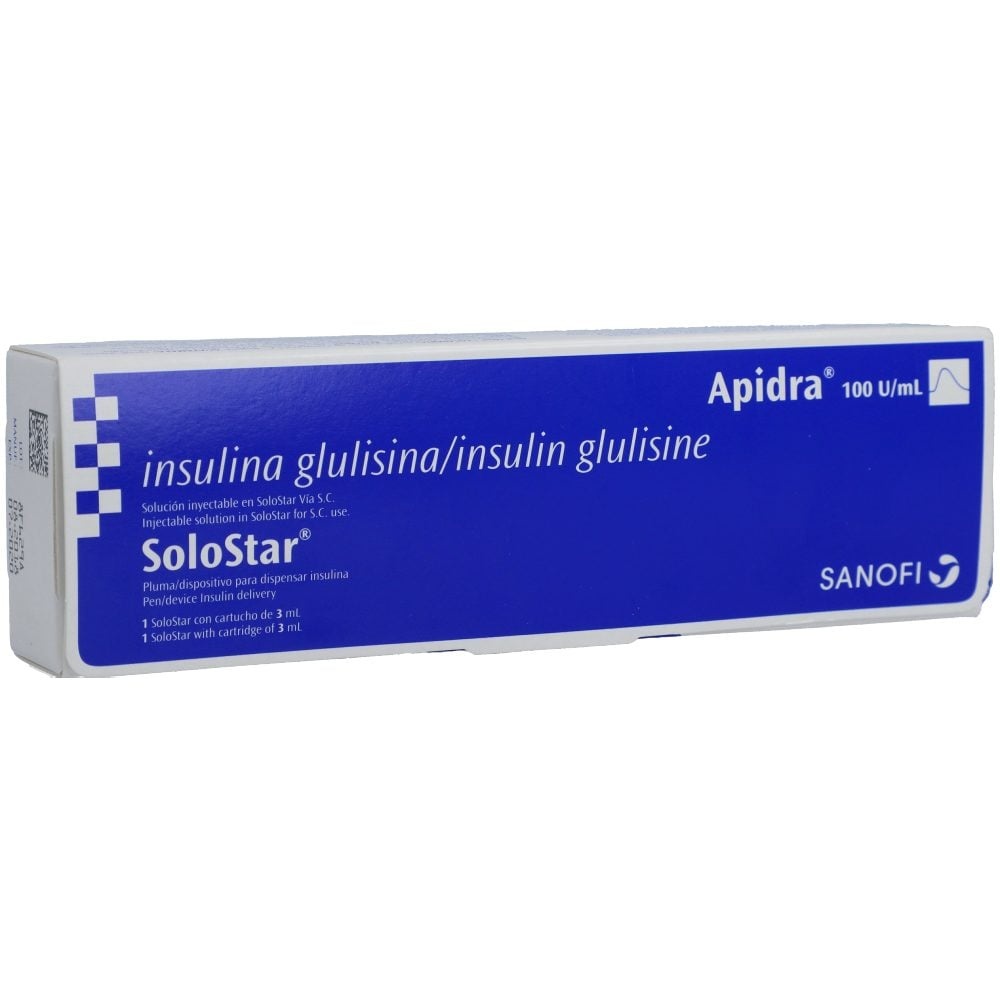

How to use APIDRA 100 units/mL, SoloStar prefilled pen solution for injection
Translated with AI
This page provides general information and does not replace a doctor’s consultation. Always consult a doctor before taking any medication. Seek urgent medical care if symptoms are severe.
Show originalContents of the leaflet
Introduction
Package Leaflet: Information for the User
Apidra SoloStar100 Units/ml solution for injection in a pre-filled pen
Insulin glulisine
Read all of this leaflet carefully and the Instructions for Use of Apidra SoloStar, pre-filled pen, before you start using this medicine, because it contains important information for you.
- Keep this leaflet, you may need to read it again.
- If you have any further questions, ask your doctor, pharmacist, or nurse.
- This medicine has been prescribed for you only. Do not pass it on to others. It may harm them, even if their symptoms are the same as yours.
- If you experience any side effects, talk to your doctor, pharmacist, or nurse. This includes any possible side effects not listed in this leaflet. See section 4.
Contents of the pack
- What is Apidra and what is it used for
- What you need to know before you use Apidra
- How to use Apidra
- Possible side effects
- Storage of Apidra
- Contents of the pack and further information
1. What is Apidra and what is it used for
Apidra is an antidiabetic agent used to reduce high blood sugar levels in patients with diabetes mellitus. It can be administered to adults, adolescents, and children from 6 years of age. Diabetes mellitus is a disease in which your body does not produce enough insulin to control blood sugar levels.
It is produced by biotechnology. It has a rapid onset of action within 10-20 minutes and a short duration of action, around 4 hours.
2. What you need to know before you use Apidra
Do not use Apidra
- If you are allergic to insulin glulisine or any of the other ingredients of this medicine (listed in section 6).
- If your blood sugar level is too low (hypoglycaemia), follow the hypoglycaemia guidelines (see the box at the end of this leaflet).
Warnings and precautions
Apidra in a pre-filled pen is only intended for injection under the skin (see also section 3). Consult your doctor if you need to inject insulin by another method.
Consult your doctor, pharmacist, or nurse before starting Apidra.
Follow the dosing instructions, monitoring (blood tests), diet, and physical activity (physical work and exercise) as indicated by your doctor.
Special patient groups
If you have liver or kidney problems, consult your doctor as you may need a lower dose.
There is not enough clinical information on the use of Apidra in children under 6 years of age.
Changes in the skin at the injection site.
The injection site should be rotated to avoid changes in the skin, such as lumps under the skin. Insulin may not work as well if injected into a thickened area (see How to use Apidra). Contact your doctor if you are currently injecting into a thickened area, before starting to inject into a different area. Your doctor may advise you to check your blood sugar levels more closely and adjust your insulin or the dose of your other antidiabetic medications.
Travel
Before traveling, consult your doctor. You may need to discuss:
- the availability of your insulin in the country you are visiting,
- insulin, needle, and other reserves,
- proper storage of insulin during travel,
- meal and insulin administration schedules during travel,
- possible effects of time zone changes,
- new health risks in the countries you will visit,
- what to do in emergency situations when you are ill or become unwell.
Illnesses and injuries
Your diabetes management may require special care in the following situations:
- If you are ill or have a major injury, your blood sugar level may increase (hyperglycaemia).
- If you do not eat enough, your blood sugar level may drop too low (hypoglycaemia).
In most cases, you will need a doctor. Make sure to consult a doctor immediately.
If you have type 1 diabetes (insulin-dependent diabetes mellitus), do not stop taking your insulin and follow a healthy diet. Always inform the people in charge of your care or treatment that you need insulin.
Some patients with type 2 diabetes mellitus of long duration and previous heart disease or stroke who were treated with pioglitazone and insulin developed heart failure. Inform your doctor as soon as possible if you experience symptoms of heart failure such as shortness of breath, rapid weight gain, or localized swelling (edema).
Using Apidra with other medicines
Some medicines can cause changes in blood sugar levels (increase, decrease, or both depending on the situation). In each case, it may be necessary to adjust your insulin dose to avoid blood sugar levels that are too low or too high. Be careful when starting to take another medicine and also when stopping it.
Tell your doctor or pharmacist if you are taking, have recently taken, or might take other medicines. Ask your doctor before taking a medicine if it can affect your blood sugar level and what measures you should take, if any.
Among the medicines that can cause a drop in your blood sugar level (hypoglycaemia) are:
- all other medicines for treating diabetes,
- angiotensin-converting enzyme (ACE) inhibitors (used to treat certain heart diseases or high blood pressure),
- disopyramide (used to treat certain heart diseases),
- fluoxetine (used to treat depression),
- fibrates (used to reduce high lipid levels in the blood),
- monoamine oxidase inhibitors (MAOIs) (used to treat depression),
- pentoxifylline, propoxyphene, salicylates (such as aspirin, used to relieve pain and moderate fever),
- sulphonamide antibiotics.
Among the medicines that can cause an increase in your blood sugar level (hyperglycaemia) are:
- corticosteroids (such as "cortisone" used to treat inflammation),
- danazol (a medicine that affects ovulation),
- diazoxide (used to treat high blood pressure),
- diuretics (used to treat high blood pressure and excess fluid retention),
- glucagon (a pancreatic hormone used to treat severe hypoglycaemia),
- isoniazid (used to treat tuberculosis),
- oestrogens and progestogens (such as the contraceptive pill used for birth control),
- phenothiazine derivatives (used to treat psychiatric disorders),
- somatotropin (growth hormone),
- sympathomimetic medicines (such as adrenaline, salbutamol, terbutaline, used to treat asthma),
- thyroid hormones (used to treat thyroid gland disorders),
- protease inhibitors (used to treat HIV),
- atypical antipsychotic medicines (such as clozapine and olanzapine).
Your blood sugar level may rise or fall if you take:
- beta-blockers (used to treat high blood pressure),
- clonidine (used to treat high blood pressure),
- lithium salts (used to treat psychiatric disorders).
Pentamidine (used to treat some parasitic infections) can cause hypoglycaemia, which can sometimes be followed by hyperglycaemia.
Beta-blockers, like other sympatholytic medicines (such as clonidine, guanethidine, and reserpine), can mask or suppress the first warning symptoms of hypoglycaemia.
If you are not sure if you are taking any of these medicines, ask your doctor or pharmacist.
Using Apidra with alcohol
Your blood sugar levels may rise or fall if you drink alcohol.
Pregnancy and breastfeeding
If you are pregnant or breastfeeding, think you may be pregnant, or are planning to have a baby, ask your doctor or pharmacist for advice before using this medicine.
Tell your doctor if you are planning to become pregnant or if you are already pregnant. Your insulin dose may need to be changed during pregnancy and after delivery. Careful control of your diabetes and prevention of hypoglycaemia are important for your baby's health.
There are limited data on the use of Apidra in pregnant women.
If you are breastfeeding, consult your doctor as you may need to adjust your insulin dose and diet.
Driving and using machines
Your ability to concentrate or react may be reduced if:
- you have hypoglycaemia (low blood sugar levels),
- you have hyperglycaemia (high blood sugar levels).
Be aware of this possible problem, considering all situations that can be a risk for you or others (such as driving a vehicle or using machines).
You should ask your doctor for advice on driving if:
- you have frequent episodes of hypoglycaemia,
- the first warning symptoms of hypoglycaemia have decreased or disappeared.
Important information about some of the ingredients of Apidra
This medicine contains less than 1 mmol (23 mg) of sodium per dose, which is essentially "sodium-free".
Apidra contains metacresol
Apidra contains metacresol, which may cause allergic reactions.
3. How to use Apidra
Dose
Follow the instructions for administration of this medicine exactly as told by your doctor. If you are not sure, consult your doctor or pharmacist again.
Your doctor will also determine the dose of Apidra you need based on your lifestyle and the results of your blood glucose tests and previous insulin treatment.
Apidra is a short-acting insulin. Your doctor may advise you to use it in combination with an intermediate-acting, long-acting, or basal insulin, or with tablets used to treat high blood sugar levels.
If you switch from another insulin to insulin glulisine, your dose may need to be adjusted by your doctor.
Many factors can influence your blood sugar level. You should know these factors so that you can react correctly to changes in your blood sugar level and avoid it becoming too high or too low. See the box at the end of the leaflet for more information.
Method of administration
Apidra is injected under the skin (subcutaneously).
Your doctor will show you which area of the skin to inject Apidra into. Apidra can be injected into the abdominal wall, thigh, or upper arm, or by continuous infusion into the abdominal wall. The effect will be slightly faster if the insulin is injected into your abdomen. As with other insulins, the injection and infusion sites within an injection area (abdomen, thigh, or upper arm) should be rotated from one injection to another.
Frequency of administration
Apidra should be administered shortly (0-15 minutes) before or shortly after meals.
Instructions for correct use
How to handle SoloStar
SoloStar is a disposable pre-filled pen that contains insulin glulisine. Apidra in a pre-filled pen is only intended for injection under the skin. Consult your doctor if you need to inject insulin by another method.
Read carefully the "Instructions for Use of SoloStar" included in this leaflet. You must use the pen as described in these Instructions for Use.
To prevent possible transmission of disease, each pen must be used by only one patient.
Before using it, always insert a new needle and perform the safety test. Use only needles compatible with SoloStar (see "Instructions for Use of SoloStar").
Inspect the sealed cartridge in the disposable pen injector before use. It should only be used if the solution is clear, colorless, and does not contain visible particles. Do not shake or mix before use.
Always use a new pen if you notice that your blood sugar control is getting worse for no apparent reason. If you think you may have a problem with SoloStar, please consult your healthcare professional.
If you use more Apidra than you should
- If you have injected too much Apidra, your blood sugar level may become too low (hypoglycaemia).
Check your blood sugar level frequently. In general, to prevent hypoglycaemia, you should eat more and monitor your blood sugar level. For more information on treating hypoglycaemia, see the box at the end of this leaflet.
If you forget to use Apidra
- If you have missed a dose of Apidra or if you have not injected enough insulin, your blood sugar level may rise too high (hyperglycaemia). Check your blood sugar level frequently. For more information on treating hyperglycaemia, see the box at the end of this leaflet.
- Do not use a double dose to make up for forgotten doses.
If you stop using Apidra
This could lead to severe hyperglycaemia (very high blood sugar levels) and ketoacidosis (increased acid in the blood because the body breaks down fat instead of sugar). Do not stop your treatment with Apidra without consulting your doctor, who will tell you what to do.
If you have any further questions on the use of this medicine, ask your doctor, pharmacist, or nurse.
Confusion between insulins
You must always check the insulin label before each injection to avoid confusion between Apidra and other insulins.
4. Possible side effects
Like all medicines, this medicine can cause side effects, although not everybody gets them.
Serious side effects
Hypoglycaemia (low blood sugar levels) can be very serious.Hypoglycaemia is a very common side effect (it can affect more than 1 in 10 patients).
Hypoglycaemia (low blood sugar levels) means you do not have enough sugar in your blood.If your blood sugar level drops too low, you may lose consciousness. Severe hypoglycaemia can cause brain damage and can be life-threatening. If you experience symptoms of low blood sugar, act immediatelyto raise your blood sugar level. See the box at the end of this leaflet for more important information about hypoglycaemia and its treatment.
If you experience the following symptoms, contact your doctor immediately:
Systemic allergic reactionsare uncommon side effects (they can affect up to 1 in 100 patients).
Generalized allergy to insulin:related symptoms may include widespread skin reactions (rash and itching all over the body), severe swelling of the skin or mucous membranes (angioedema), difficulty breathing, low blood pressure with rapid heartbeat and sweating. These can be symptoms of serious generalized allergy to insulins, including anaphylactic reaction, which can be life-threatening.
Hyperglycaemia (high blood sugar levels) means you have too much sugar in your blood.
The frequency of hyperglycaemia cannot be estimated. If your blood sugar level is too high, this indicates that you may need more insulin than you have injected. This can be serious if your blood sugar level becomes very high.
For more information on the signs and symptoms of hyperglycaemia, see the box at the end of this leaflet.
Other side effects
- Changes in the skin at the injection site.
If you inject insulin too frequently into the same area, the fatty tissue may shrink (lipoatrophy) or thicken (lipohypertrophy) (it can affect up to 1 in 100 people). Lumps under the skin can also occur due to the accumulation of a protein called amyloid (cutaneous amyloidosis; the frequency cannot be estimated). Insulin may not work as well if injected into a thickened area. Change the injection site to help avoid these skin changes.
Common side effects(can affect up to 1 in 10 patients)
- Allergic reactions and skin reactions at the injection site
You may experience injection site reactions (such as redness, intense pain, itching, hives, swelling, or inflammation). These reactions can also spread around the injection site. Most minor insulin reactions resolve on their own within a few days or weeks.
Side effects with unknown frequency
- Eye reactions
A significant change (improvement or worsening) in your blood sugar control can cause a temporary worsening of your vision. If you have proliferative retinopathy (an eye disease related to diabetes), severe hypoglycaemic attacks can cause temporary loss of vision.
Reporting of side effects
If you experience any side effects, talk to your doctor, pharmacist, or nurse, even if it is possible side effects not listed in this leaflet. You can also report side effects directly through the national reporting system listed in Appendix V. By reporting side effects, you can help provide more information on the safety of this medicine.
5. Storage of Apidra
Keep this medicine out of the sight and reach of children.
Do not use this medicine after the expiry date which is stated on the carton and on the label of the pen after CAD/EXP. The expiry date is the last day of the month indicated.
Unused pens
Store in a refrigerator (between 2°C and 8°C).
Do not freeze.
Do not place SoloStar near the freezer compartment or next to a cold accumulator.
Store the pre-filled pen in the outer packaging to protect it from light.
In-use pens
Prefilled pens in use (or to be carried as a spare) may be stored for a maximum of 4 weeks below 25°C and protected from direct heat or direct light. The pen in use must not be stored in the refrigerator.
Do not use it after this time period.
Do not use this medicine if it is not colorless and transparent.
Medicines should not be disposed of via wastewater or household waste. Ask your pharmacist how to dispose of the packaging and medicines that are no longer needed. This will help protect the environment.
6. Container Contents and Additional Information
Composition of Apidra
- The active substance is insulin glulisine. Each ml of solution contains 100 Units of insulin glulisine (equivalent to 3.49 mg).
- The other components are: metacresol (see section 2 "Apidra contains metacresol"), sodium chloride (see section 2 "Important information about some of the components of Apidra"), trometamol, polysorbate 20, concentrated hydrochloric acid, sodium hydroxide, water for injectable preparations.
Appearance of the Product and Container Contents
Apidra SoloStar 100 Units/ml solution for injection in a pre-filled pen. It is a clear, colorless, aqueous solution without visible particles.
Each pen contains 3 ml of solution, equivalent to 300 Units. There are packs of 1, 3, 4, 5, 6, 8, 9, and 10 pre-filled pens. Not all pack sizes may be marketed.
Marketing Authorization Holder and Manufacturer
Marketing Authorization Holder:
Sanofi-Aventis Deutschland GmbH
D-65926 Frankfurt am Main
Germany
Manufacturer:
Sanofi-Aventis Deutschland GmbH
Industriepark Höchst, D-65926 Frankfurt
Germany
You can request more information about this medicinal product from the local representative of the Marketing Authorization Holder.
België/Belgique/Belgien Sanofi Belgium Tél/Tel: +32 (0)2 710 54 00 | Luxembourg/Luxemburg Sanofi Belgium Tél/Tel: +32 (0)2 710 54 00 (Belgique/Belgien) |
| Magyarország SANOFI-AVENTIS Zrt. Tel.: +36 1 505 0050 |
Ceská republika Sanofi s.r.o. Tel: +420 233 086 111 | Malta Sanofi S.r.l. Tel: +39 02 39394275 |
Danmark Sanofi A/S Tlf: +45 45 16 70 00 | Nederland Sanofi B.V. Tel: +31 20 245 4000 |
Deutschland Sanofi-Aventis Deutschland GmbH Tel.: 0800 52 52 010 Tel. from abroad: +49 69 305 21 131 | Norge sanofi-aventis Norge AS Tlf: +47 67 10 71 00 |
Eesti Swixx Biopharma OÜ Tel: +372 640 10 30 | Österreich sanofi-aventis GmbH Tel: +43 1 80 185 – 0 |
Ελλάδα Sanofi-Aventis Μονοπρ?σωπη AEBE Τηλ: +30 210 900 16 00 | Polska Sanofi Sp. z o.o. Tel.: +48 22 280 00 00 |
España sanofi-aventis, S.A. Tel: +34 93 485 94 00 | Portugal Sanofi - Produtos Farmacêuticos, Lda. Tel: +351 21 35 89 400 |
France Sanofi Winthrop Industrie Tél: 0 800 222 555 Appel depuis l’étranger : +33 1 57 63 23 23 Hrvatska Swixx Biopharma d.o.o. Tel: +385 1 2078 500 | România Sanofi Romania SRL Tel: +40 (0) 21 317 31 36 |
Ireland sanofi-aventis Ireland Ltd. T/A SANOFI Tel: +353 (0) 1 403 56 00 | Slovenija Swixx Biopharma d.o.o. Tel: +386 1 235 51 00 |
Ísland Vistor hf. Sími: +354 535 7000 | Slovenská republika Swixx Biopharma s.r.o. Tel: +421 2 208 33 600 |
Italia Sanofi S.r.l. Tel: 800 13 12 12 (technical questions) 800 536389 (other questions) | Suomi/Finland Sanofi Oy Puh/Tel: +358 (0) 201 200 300 |
Κ?προς C.A. Papaellinas Ltd. Τηλ: +357 22 741741 | Sverige Sanofi AB Tel: +46 (0)8 634 50 00 |
Latvija Swixx Biopharma SIA Tel: +371 6 616 47 50 | United Kingdom(Northern Ireland) sanofi-aventis Ireland Ltd. T/A SANOFI Tel: +44 (0) 800 035 2525 |
Lietuva Swixx Biopharma UAB Tel: +370 5 236 91 40 |
Date of Last Revision of this Leaflet:
Another Source of Information
Detailed information on this medicinal product is available on the European Medicines Agency web site: http://www.ema.europa.eu/
HYPERGLYCEMIA AND HYPOGLYCEMIA
Always carry something containing sugar (at least 20 grams) with you.
Always carry some information that indicates you are a diabetic person.
HYPERGLYCEMIA (high blood sugar levels)
If you have very high blood sugar levels (hyperglycemia), you may not have injected enough insulin.
Why does hyperglycemia occur?
Some examples are:
- you did not inject your insulin or did not inject enough, or if its effect has diminished, for example, due to incorrect storage,
- you are doing less exercise than usual, you are stressed (emotional distress, excitement), or you are suffering from an injury, an operation, infection, or fever,
- you are taking or have taken certain medications (see section 2, "Using Apidra with other medications").
Warning signs of hyperglycemia
Thirst, increased need to urinate, fatigue, dry skin, redness of the face, loss of appetite, low blood pressure, rapid heartbeat, and the presence of glucose and ketone bodies in the urine. Stomach pain, deep and rapid breathing, drowsiness, or even loss of consciousness may be signs of a serious condition (ketoacidosis) due to lack of insulin.
What to do in case of hyperglycemia?
You must analyze your blood sugar level and your urine acetone level as soon as any of the above symptoms occur. Severe hyperglycemia or ketoacidosis must always be treated by a doctor, usually in a hospital.
HYPOGLYCEMIA (low blood sugar levels)
If your blood sugar level drops too low, you may lose consciousness. Severe hypoglycemia can cause a heart attack or brain damage and can be life-threatening. Normally, you should be able to recognize when your blood sugar level is dropping too low to take the necessary measures.
Why does hypoglycemia occur?
Some examples are:
- you inject too much insulin,
- you miss meals or delay them,
- you do not eat enough, or you eat foods that contain fewer carbohydrates than usual (sugar and substances similar to sugar are called carbohydrates; however, artificial sweeteners are NOT carbohydrates),
- you lose carbohydrates due to vomiting or diarrhea,
- you drink alcohol, especially if you are not eating much,
- you are doing more exercise than usual or a different type of physical activity,
- you are recovering from an injury, an operation, or other types of stress,
- you are recovering from an illness or fever,
- you are taking or have stopped taking certain medications (see section 2, "Using Apidra with other medications").
It is also more likely to occur if:
- you have just started insulin treatment or changed to another insulin preparation,
- your blood sugar levels are almost normal or are unstable,
- you change the injection site (e.g., from the thigh to the upper arm),
- you have severe kidney or liver disease, or other diseases such as hypothyroidism.
Warning signs of hypoglycemia
Ejemplos de síntomas que le indican que su nivel de azúcar en sangre está bajando mucho o muy deprisa: sudor, piel húmeda y pegajosa, ansiedad, latido rápido del corazón, tensión arterial alta, palpitaciones y latido irregular del corazón. Estos síntomas se producen a menudo antes de que aparezcan los síntomas de un bajo nivel de azúcar en el cerebro.
- In your brain
Ejemplos de síntomas que le indican que existe un nivel bajo de azúcar en el cerebro: dolores de cabeza, hambre intensa, náuseas, vómitos, cansancio, sopor, trastornos del sueño, inquietud, comportamiento agresivo, fallos de concentración, reacciones alteradas, depresión, confusión, trastornos del habla (a veces, pérdida total del habla), trastornos visuales, temblor, parálisis, sensaciones de hormigueo (parestesias), sensaciones de entumecimiento y hormigueo en la zona de la boca, mareos, pérdida del autocontrol, incapacidad para cuidar de sí mismo, convulsiones y pérdida del conocimiento.
Los primeros síntomas de alerta de hipoglucemia (“síntomas de aviso”) pueden cambiar, atenuarse o faltar por completo si:
- es una persona de edad avanzada,
- ha padecido diabetes durante mucho tiempo,
- sufre cierto tipo de enfermedad nerviosa (neuropatía diabética autónoma),
- ha sufrido recientemente un episodio de hipoglucemia (por ejemplo, el día antes) o si ésta se desarrolla gradualmente,
- tiene niveles casi normales o, al menos, niveles muy mejorados de azúcar en sangre,
- está tomando o ha tomado ciertos medicamentos (ver la sección 2, “Uso de Apidra con otros medicamentos”).
En este caso, puede desarrollar una hipoglucemia grave (e incluso desmayarse) antes de darse cuenta del problema. Esté siempre familiarizado con sus síntomas de aviso. Si fuera necesario, la realización con más frecuencia de un análisis del azúcar en sangre puede ayudar a identificar episodios hipoglucémicos leves, que en caso contrario podrían pasar inadvertidos. Si no está seguro de poder reconocer sus síntomas de aviso, evite situaciones (como conducir un coche) que puedan ponerle en peligro a usted o a otras personas como consecuencia de la hipoglucemia.
What to do if you experience hypoglycemia?
- Do not inject insulin. Immediately ingest 10 to 20 grams of sugar, such as glucose, sugar cubes, or a sugary drink. Note: artificial sweeteners and sugar-free food products do not help treat hypoglycemia.
- Afterwards, eat something that has a prolonged effect on raising your blood sugar level (such as bread or pasta). Your doctor or nurse should have discussed this with you.
- If hypoglycemia recurs, take another 10 to 20 grams of sugar.
- Consult a doctor immediately if you are unable to control hypoglycemia or if it recurs.
Tell your family, friends, and people close to you:
If you are unable to swallow or lose consciousness, you will need an injection of glucose or glucagon (a medication that increases blood sugar levels). These injections are justified even if you are not sure if you have hypoglycemia.
It is recommended to analyze your blood sugar level immediately after ingesting glucose to confirm that you actually have hypoglycemia.
Apidra SoloStar solution for injection in a pre-filled pen. INSTRUCTIONS FOR USE
SoloStar is a pre-filled pen for injecting insulin. Your doctor has decided that SoloStar is suitable for you based on your ability to handle SoloStar. Before using SoloStar, talk to your doctor, pharmacist, or nurse about the correct injection technique.
Read these instructions carefully before using your SoloStar. If you are not trained to use SoloStar or cannot follow these instructions completely on your own, you should only use SoloStar with the help of a person who can follow these instructions completely. Hold the pen as shown in this leaflet. To ensure you read the dose correctly, hold the pen horizontally, with the needle on the left and the dose selector on the right, as shown in the diagram below.
You can set doses from 1 to 80 units in steps of 1 unit. Each pen contains multiple doses.
Keep this leaflet for future reference.
If you have any questions about SoloStar or diabetes, ask your doctor, pharmacist, or nurse, or call the local sanofi-aventis phone number on the front of this leaflet.



Scheme of the pen
Important information for using SoloStar:
- Always insert a new needle before each use. Use only needles compatible with SoloStar.
- Do not select a dose or press the button if there is no needle inserted.
- Always perform the safety test before each injection (see Step 3).
- This pen is for your use only. Do not share it with anyone.
- If someone else is giving you the injection, be careful to avoid accidental needle damage and infection transmission.
- Never use SoloStar if it is damaged or if you are not sure it is working correctly.
- Always have a spare SoloStar in case your SoloStar is lost or damaged.
Step 1. Checking the insulin
- Check the label on your SoloStar to make sure it contains the correct insulin. Apidra SoloStar is blue. It has a dark blue injection button with a protruding ring at the end.
- Remove the pen cap.
- Check the appearance of your insulin. Apidra is a clear insulin. Do not use SoloStar if the insulin is cloudy, colored, or contains particles.
Step 2. Attaching the needle
Always use a new, sterile needle for each injection. This helps prevent contamination and possible needle blockage.
- Remove the protective seal from the new needle.
- Align the needle with the pen and keep it straight while inserting it (screw or push, depending on the type of needle).
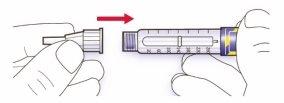
- If the needle is not kept straight while inserting, the rubber seal may break and cause leakage or needle breakage.

Step 3. Safety test
Always perform the safety test before each injection. This ensures that you receive the exact dose, as it:
- ensures the pen and needle are working perfectly
- removes air bubbles
- Select a dose of 2 units by turning the dose selector.
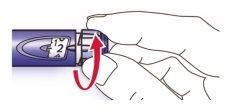
- Remove the outer needle protector and keep it to remove the used needle after each injection. Remove the inner needle protector and discard it.

- Hold the pen with the needle pointing upwards.
- Gently tap the insulin reservoir to make any air bubbles rise to the needle.
- Press the injection button completely. Check that insulin appears at the needle tip.
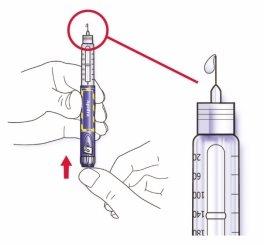
You can perform the safety test several times until insulin appears.
- If no insulin appears, check for air bubbles and repeat the safety test two more times to eliminate them.
- If insulin still does not appear, the needle may be blocked. Change the needle and try again.
- If insulin does not appear after changing the needle, your SoloStar may be damaged. Do not use this SoloStar.
Step 4. Selecting the dose
You can select doses in steps of 1 unit, from a minimum of 1 unit to a maximum of 80 units. If you need a dose greater than 80 units, you will need to give two or more injections.
- Check that the dose window shows "0" after the safety test.
- Select your dose (in the example below, the selected dose is 30 units). If you turn the dose selector too far, you can turn it back.

- Do not press the injection button while turning the dose selector, as insulin may be released.
- You will not be able to turn the dose selector if the number of units exceeds the amount left in the pen. Do not force the dose selector. In this case, you can inject the remaining amount in the pen and complete your dose with a new SoloStar or use a new SoloStar for the full dose.
Step 5. Injecting the dose
- Use the injection method that your doctor, pharmacist, or nurse taught you.
- Insert the needle into the skin.
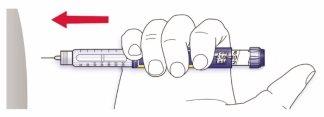
- Release the dose by pressing the injection button completely. The number in the dose window will return to "0" when the dose is injected.

Our 10 seconds">
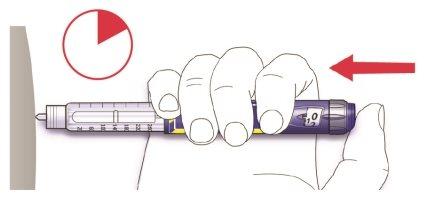
- Keep the injection button fully pressed. Slowly count to 10 before removing the needle from the skin. This ensures that the full dose is released.
The plunger of the pen moves with each dose. The plunger will reach the end of the cartridge when the total of 300 units of insulin has been used.
Step 6.Removal and disposal of the needle
After each injection, remove the needle and keep SoloStar without the needle.
This helps to prevent:
- Contaminations and/or infections,
- Air entering the insulin reservoir and loss of insulin that can lead to an inaccurate dose.
- Place the outer needle shield on the needle, and use it to unscrew the needle from the pen. To reduce the risk of needle accidents, never replace the inner shield.
- If your injection is administered by another person, or if you are administering an injection to another person, you must be especially careful when removing and disposing of the needle. Follow the recommended safety measures for needle removal and disposal (contact your doctor, pharmacist, or nurse) in order to reduce the risk of needle accidents and the transmission of infectious diseases.
- Dispose of the needle safely, as your doctor, pharmacist, or nurse has taught you.
- Always put the pen cap on after each injection and store the pen until your next injection.
Storage instructions
Check the back of this leaflet to follow the instructions on how to store SoloStar.
If SoloStar is stored in a cool place, it should be taken out 1 to 2 hours before injection to allow it to reach room temperature. Injecting cold insulin is more painful.
SoloStar should be discarded as indicated by your local authorities.
Maintenance
Protect SoloStar from dust and dirt.
You can clean the outside of your SoloStar with a damp cloth.
Do not soak, wash, or lubricate the pen, as this could damage it.
SoloStar is designed to function with precision and safety. It should be handled with care. Avoid situations in which SoloStar could be damaged. If you are concerned that your SoloStar may be damaged, use a new one.
- Country of registration
- Average pharmacy price46.97 EUR
- Active substance
- Prescription requiredYes
- Manufacturer
- This information is for reference only and does not constitute medical advice. Always consult a doctor before taking any medication. Oladoctor is not responsible for medical decisions based on this content.
- Alternatives to APIDRA 100 units/mL, SoloStar prefilled pen solution for injectionDosage form: INJECTABLE, 100 U/mlActive substance: insulin glulisineManufacturer: Sanofi-Aventis Deutschland GmbhPrescription requiredDosage form: INJECTABLE, 100 U/mlActive substance: insulin glulisineManufacturer: Sanofi-Aventis Deutschland GmbhPrescription requiredDosage form: INJECTABLE, 100 U/mlActive substance: insulin (human)Manufacturer: Novo Nordisk A/SPrescription required
Online doctors for APIDRA 100 units/mL, SoloStar prefilled pen solution for injection
Discuss questions about APIDRA 100 units/mL, SoloStar prefilled pen solution for injection, including use, safety considerations and prescription review, subject to medical assessment and local regulations.
Frequently Asked Questions
















